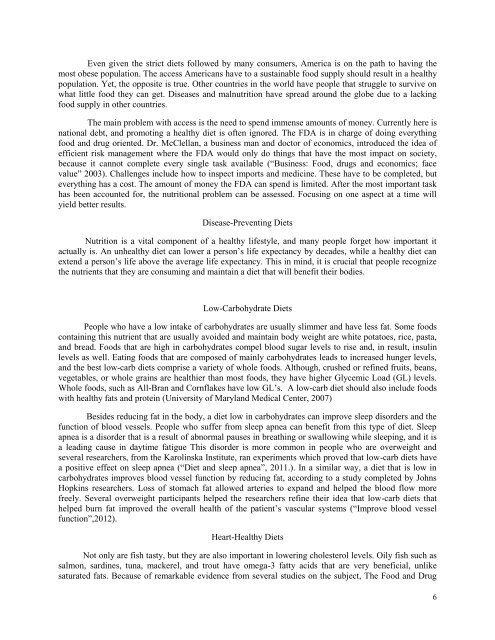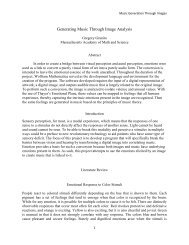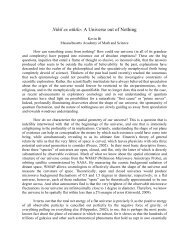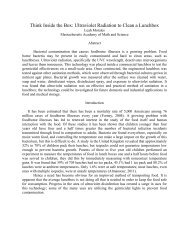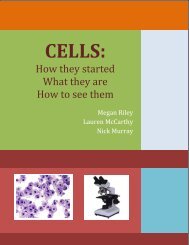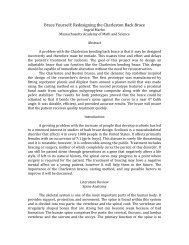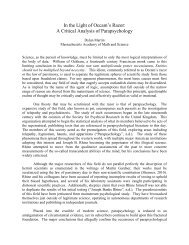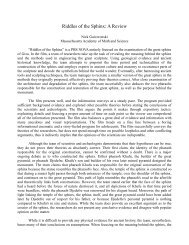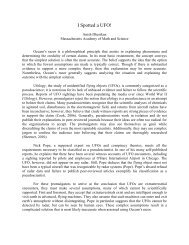Got Food? - the Scientia Review
Got Food? - the Scientia Review
Got Food? - the Scientia Review
You also want an ePaper? Increase the reach of your titles
YUMPU automatically turns print PDFs into web optimized ePapers that Google loves.
Even given <strong>the</strong> strict diets followed by many consumers, America is on <strong>the</strong> path to having <strong>the</strong><br />
most obese population. The access Americans have to a sustainable food supply should result in a healthy<br />
population. Yet, <strong>the</strong> opposite is true. O<strong>the</strong>r countries in <strong>the</strong> world have people that struggle to survive on<br />
what little food <strong>the</strong>y can get. Diseases and malnutrition have spread around <strong>the</strong> globe due to a lacking<br />
food supply in o<strong>the</strong>r countries.<br />
The main problem with access is <strong>the</strong> need to spend immense amounts of money. Currently here is<br />
national debt, and promoting a healthy diet is often ignored. The FDA is in charge of doing everything<br />
food and drug oriented. Dr. McClellan, a business man and doctor of economics, introduced <strong>the</strong> idea of<br />
efficient risk management where <strong>the</strong> FDA would only do things that have <strong>the</strong> most impact on society,<br />
because it cannot complete every single task available (―Business: <strong>Food</strong>, drugs and economics; face<br />
value‖ 2003). Challenges include how to inspect imports and medicine. These have to be completed, but<br />
everything has a cost. The amount of money <strong>the</strong> FDA can spend is limited. After <strong>the</strong> most important task<br />
has been accounted for, <strong>the</strong> nutritional problem can be assessed. Focusing on one aspect at a time will<br />
yield better results.<br />
Disease-Preventing Diets<br />
Nutrition is a vital component of a healthy lifestyle, and many people forget how important it<br />
actually is. An unhealthy diet can lower a person‘s life expectancy by decades, while a healthy diet can<br />
extend a person‘s life above <strong>the</strong> average life expectancy. This in mind, it is crucial that people recognize<br />
<strong>the</strong> nutrients that <strong>the</strong>y are consuming and maintain a diet that will benefit <strong>the</strong>ir bodies.<br />
Low-Carbohydrate Diets<br />
People who have a low intake of carbohydrates are usually slimmer and have less fat. Some foods<br />
containing this nutrient that are usually avoided and maintain body weight are white potatoes, rice, pasta,<br />
and bread. <strong>Food</strong>s that are high in carbohydrates compel blood sugar levels to rise and, in result, insulin<br />
levels as well. Eating foods that are composed of mainly carbohydrates leads to increased hunger levels,<br />
and <strong>the</strong> best low-carb diets comprise a variety of whole foods. Although, crushed or refined fruits, beans,<br />
vegetables, or whole grains are healthier than most foods, <strong>the</strong>y have higher Glycemic Load (GL) levels.<br />
Whole foods, such as All-Bran and Cornflakes have low GL‘s. A low-carb diet should also include foods<br />
with healthy fats and protein (University of Maryland Medical Center, 2007)<br />
Besides reducing fat in <strong>the</strong> body, a diet low in carbohydrates can improve sleep disorders and <strong>the</strong><br />
function of blood vessels. People who suffer from sleep apnea can benefit from this type of diet. Sleep<br />
apnea is a disorder that is a result of abnormal pauses in breathing or swallowing while sleeping, and it is<br />
a leading cause in daytime fatigue This disorder is more common in people who are overweight and<br />
several researchers, from <strong>the</strong> Karolinska Institute, ran experiments which proved that low-carb diets have<br />
a positive effect on sleep apnea (―Diet and sleep apnea‖, 2011.). In a similar way, a diet that is low in<br />
carbohydrates improves blood vessel function by reducing fat, according to a study completed by Johns<br />
Hopkins researchers. Loss of stomach fat allowed arteries to expand and helped <strong>the</strong> blood flow more<br />
freely. Several overweight participants helped <strong>the</strong> researchers refine <strong>the</strong>ir idea that low-carb diets that<br />
helped burn fat improved <strong>the</strong> overall health of <strong>the</strong> patient‘s vascular systems (―Improve blood vessel<br />
function‖,2012).<br />
Heart-Healthy Diets<br />
Not only are fish tasty, but <strong>the</strong>y are also important in lowering cholesterol levels. Oily fish such as<br />
salmon, sardines, tuna, mackerel, and trout have omega-3 fatty acids that are very beneficial, unlike<br />
saturated fats. Because of remarkable evidence from several studies on <strong>the</strong> subject, The <strong>Food</strong> and Drug<br />
6


